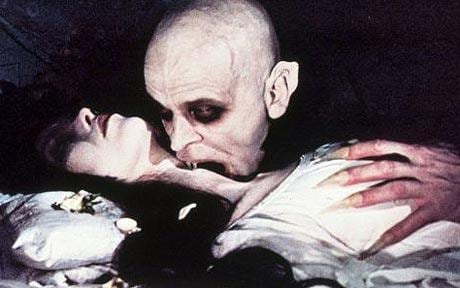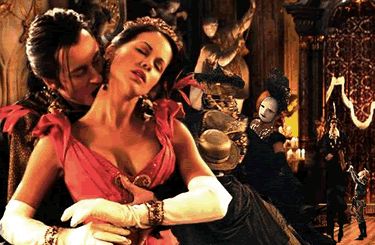What does our love of the human and monster romance reveal about our sexuality?

A few minutes every morning is all you need.
Stay up to date on the world's Headlines and Human Stories. It's fun, it's factual, it's fluff-free.
Humans crave media in which one of us falls in love with a monster – aka the monster romance. The crossover between the romance and monster genres permeates the film industry, the publishing industry, fan fiction and more. Despite some negative reactions surrounding these unconventional relationships, the monster romance trope prevails and continues to thrive. So what is it about a sparkly vampire aged nearly a century and his irrevocable passion for a plain Jane that draws such a formidable fan base?
Adored by demographics from women of all ages to the queer community, the monster romance story is in no short supply. Nor is it a recent genre invention. For example, Sheridan Le Fanu’s 1872 gothic novella “Carmilla” tells the story of a young woman seduced by a lesbian vampire – and yes, it predates Bram Stoker’s “Dracula.”
From more traditional humanoid and human romances, like vampires and werewolves, to more out-there pairings, like Guillermo Del Toro’s film “The Shape of Water,” monsters hold much fascination for artists and audiences. So what implications does this popular media form hold regarding our sexual desires and fantasies?
The erotic nature of the vampire

The vampire genre dominates the monster romance and human/supernatural sexual encounters. From Bram Stoker and Sheridan Le Fanu to Anne Rice and Stephanie Meyer, the popularity of vampire narratives and the massive response from consumers goes beyond Team Edward and Team Jacob.
Three vampire genre periods emerge over the past few hundred years. “Carmilla” and “Dracula” both reside in the gothic genre, in which the antagonist or antagonistic force traps the protagonist and forces them to face their own dark desires or those of the antagonist.
After a dry period in the genre, Anne Rice’s books sparked a resurgence in our obsession with vampires. The characters diverged from the traditional narrative in expressing their sexuality, which unlocked a new queer following. Then came Meyer’s “Twilight” saga.
Dr. Gail Saltz, psychiatrist, psychoanalyst, columnist, author and more, spoke exclusively with TMS on how our fantasies manifest in popular media and how popular media influences our fantasies.
“I think vampires are pretty transparently erotic,” says Dr. Saltz. “The vampire comes in the night and takes you, whether you want it or not, because the vampire is so incredibly drawn to you. It’s sort of this mix of sexuality and appetite. Neck biting has sexual and erotic overtones. All of these acts [characteristic of the vampire genre] are thematically thinly veiled sex.”
What’s the appeal?
“It is a normal part of human nature to have a lot of fantasy that you would not necessarily have any desire to do in real life,” says Dr. Saltz. “In fact, rape fantasies of some sort are very common for women. But it’s something that they would in no way want to happen in real life or even in pretend play with their partner.
“Sexual fantasy is completely separate from real life … Women especially like to fantasize that they are free to sexually experiment with anyone they want to. And in the fantasy [the sexual partner] could be human, not human, anywhere along the sexual spectrum … It doesn’t mean they want to have sex with an alien, should an alien appear. These things are all stand-ins for something exciting, something different.
“Watching things like a movie or listening to a podcast that provides [a crossover between romance and horror or crime] can be a big draw, very titillating,” says Dr. Saltz. “It may not even be in a person’s awareness that that’s what’s happening, or that’s what the draw is … It provides great content for fantasy. I think shows and things that speak to crime or horror often do provide those sorts of things.”
It’s easy to see why the queer community revels in monster romances, especially when so many of us experience severe repression and shame over our sexual identities. The freedom to fantasize about an unconventional relationship feeds into the guilt-free escapist tendencies we formed as coping mechanisms.
Perhaps these dynamics appeal primarily to women because the vast majority of these stories take the perspective of the female gaze in a society saturated by patriarchal narratives. When the media, dominated by the male gaze, encourages female hypersexualization yet casts aspersions on that hypersexualization, sexual fantasies are a safe way to explore our bodies and desires without shame.
The contradiction between hypersexualization and repression

“People often struggle with [feelings of guilt] in their sex lives,” says Dr. Saltz. “It depends on people’s backgrounds and what they’ve struggled with in their lives – particularly the LGBTQ community, which receives so much negative stigma. Many [in the queer community] grew up in a very stigmatized environment. And so, the freedom to pursue what they want to pursue might be more possible in fantasy, especially when watching media that involves themes like sadism or masochism. Somebody was the bad guy, somebody was the good guy, somebody was the victim.
“One thing that can run through these fantasies is a defense mechanism called ‘identification with the aggressor,’ which means the monster came along and did something to you,” says Dr. Saltz. “It’s not just the fantasy of being the person it was done to, it’s also the fantasy of being the monster. The aggressive one. Because that being has all the power. Particularly if there have been any struggles in the past where you were the powerless one. When you speak to women and people in the LGBTQ community, it’s not unusual. Imagining being the one with the power can be very appealing.”
The question remains why we often turn to fantasy in a society so saturated by sex? More and more modern media provides us with sexual escapism. More erotic vampires entranced by humans, more unearthly creatures inexplicably desire us. Fanfiction is a prime example of choose-your-own-adventure sexual escapism.
Why does that often fail to translate into our actual sex lives? Perhaps it’s the widespread “that’s weird” reaction to monster romance, or maybe the concept of sexual freedom threatens convention. Dr. Saltz poses the idea of hypersexualization as a defense mechanism. When we continually shout about our sex lives, it’s easy to fool ourselves and others into thinking we’ve overcome our sexual repression.
Have a tip or story? Get in touch with our reporters at tips@themilsource.com




Comments ()